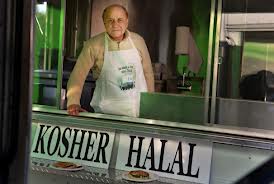By: Joseph B. Kadane
The recent killings in Paris make it clear, if it wasn’t before, that there’s work to be done. And much of this work needs to be done among and by the two religious groups most at loggerheads: Muslims and Jews.
It seems obvious that there is a strain in both Shia and especially Sunni Islam that practices and endorses violence. While less in the public notice, there is also a violent strain among some Jews; in particular the West Bank settlers. Let us remember the 29 dead and 125 wounded victims of Baruch Goldstein, who in 1994 slaughtered Muslims at prayer in Hebron. There is a group of admirers of Goldstein who make a big deal about his gravesite. In what sense are the Jewish admirers of Goldstein different, ethically, from the Muslim admirers of bin Laden and al-Awlaki?
What’s to be done? The liberal Jews and Muslims, whom I think are the vast majority, have been all too slow in publicly condemning the violence perpetrated by their co-religionists. I suspect that each group is shy about this because they do not want to be labeled as anti-semites or anti-Islam, respectively. Both groups need to reassess their values, and how they define themselves religiously and politically.
I think the real opportunity for progress lies in the hands of the more orthodox Muslims and Jews. They may have more in common than they now think. Both, for example, have rules regarding appropriate food call halal by Muslims and kosher by Jews. It is my impression that the two sets of rules are remarkably similar.
Suppose those charged with certifying halal and kosher started an interfaith dialog to compare the rules. Suppose they accompanied each other in their inspections. It is entirely possible that certain foods could then be certified as halal and kosher. It is even possible that after awhile, each could agree to endorse the inspections conducted by the other.
What consequences might this have? First, it would benefit both groups by making certified foods more available, particularly in areas where one or the other group is in the minority. Secondly, it would be a powerful statement by the orthodox leadership of both religions about their shared history and values.
The recent killings in Paris make it clear, if it wasn’t before, that there’s work to be done. And much of this work needs to be done among and by the two religious groups most at loggerheads: Muslims and Jews.
It seems obvious that there is a strain in both Shia and especially Sunni Islam that practices and endorses violence. While less in the public notice, there is also a violent strain among some Jews; in particular the West Bank settlers. Let us remember the 29 dead and 125 wounded victims of Baruch Goldstein, who in 1994 slaughtered Muslims at prayer in Hebron. There is a group of admirers of Goldstein who make a big deal about his gravesite. In what sense are the Jewish admirers of Goldstein different, ethically, from the Muslim admirers of bin Laden and al-Awlaki?
What’s to be done? The liberal Jews and Muslims, whom I think are the vast majority, have been all too slow in publicly condemning the violence perpetrated by their co-religionists. I suspect that each group is shy about this because they do not want to be labeled as anti-semites or anti-Islam, respectively. Both groups need to reassess their values, and how they define themselves religiously and politically.
I think the real opportunity for progress lies in the hands of the more orthodox Muslims and Jews. They may have more in common than they now think. Both, for example, have rules regarding appropriate food call halal by Muslims and kosher by Jews. It is my impression that the two sets of rules are remarkably similar.
Suppose those charged with certifying halal and kosher started an interfaith dialog to compare the rules. Suppose they accompanied each other in their inspections. It is entirely possible that certain foods could then be certified as halal and kosher. It is even possible that after awhile, each could agree to endorse the inspections conducted by the other.
What consequences might this have? First, it would benefit both groups by making certified foods more available, particularly in areas where one or the other group is in the minority. Secondly, it would be a powerful statement by the orthodox leadership of both religions about their shared history and values.
Would it have prevented the attack on the Jewish food market in Paris if it were a Muslim market as well? Perhaps, and perhaps not. But it would be a start. And we need to start.
Would it have prevented the attack on the Jewish food market in Paris if it were a Muslim market as well? Perhaps, and perhaps not. But it would be a start. And we need to start.


Leave a Reply
You must be logged in to post a comment.